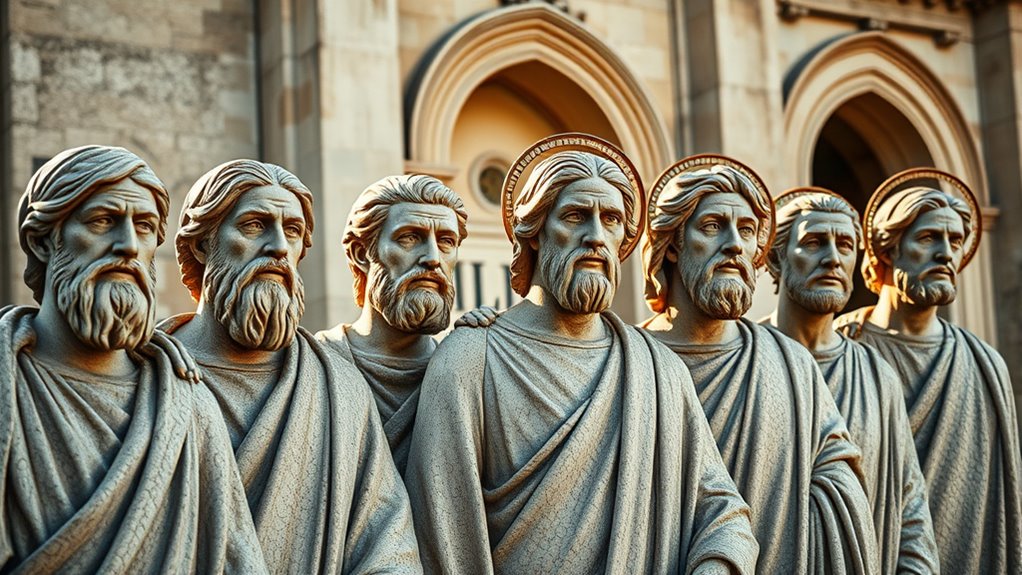The Twelve Apostles were Jesus’s closest disciples, chosen from diverse backgrounds like fishermen, tax collectors, and carpenters. They were called to spread his teachings, perform miracles, and lead the early church, often facing persecution and danger. Their journeys included incredible moments of faith and sacrifice that shaped Christianity’s foundation. As you explore further, you’ll discover how their lives and struggles continue to influence believers today.
Key Takeaways
- The Twelve Apostles were Jesus’s chosen disciples to spread his teachings and establish the early church.
- They came from diverse backgrounds, including fishermen, tax collectors, and carpenters.
- They performed miracles, such as healing the sick and casting out spirits, to demonstrate divine authority.
- The apostles faced persecution and martyrdom for their faith, embodying steadfastness and sacrifice.
- Their leadership and teachings laid the foundation for Christianity’s growth and global influence.
The Names and Origins of the Apostles

The twelve apostles were chosen by Jesus to spread his teachings and establish the early church. Their names—Peter, James, John, and others—highlight diverse backgrounds, yet they share a common purpose rooted in biblical symbolism. Each apostle’s origin reflects a unique story, but collectively, they form the foundation of apostolic succession, linking Jesus directly to the Christian community. Their names carry significance, often symbolizing qualities like faith, leadership, and humility. Understanding their origins helps us grasp how their lives and roles fulfilled biblical prophecy. Through their actions, they exemplify the continuity of Jesus’ mission, serving as spiritual successors in the church’s lineage. Their diverse backgrounds underscore the universal message Jesus preached, uniting people from different walks of life under a shared divine calling. Recognizing the diverse backgrounds of the apostles emphasizes the inclusive nature of Jesus’ mission and its appeal across different cultures and social classes.
Their Calling and Early Lives

Understanding where the apostles came from and what they did before following Jesus offers valuable insight into their unique backgrounds and the nature of their calling. Many of the apostles’ professions, such as fishermen, carpenters, and tax collectors, reflect their everyday lives and skills. These roles also carry apostle symbolism, highlighting humility, hard work, and a willingness to serve. For example, Peter and Andrew were fishermen, representing patience and perseverance. Matthew was a tax collector, symbolizing transformation and acceptance. Their early lives show that Jesus called ordinary people, not scholars or elites, to carry out extraordinary missions. This background helped shape their faith and commitment, making their later works even more impactful. Their diverse professions reveal that God’s call can reach anyone, regardless of background. The essential oils associated with their professions, like cedarwood for scalp health or peppermint for circulation, subtly symbolize the qualities they embodied in their missions. Additionally, understanding the cultural context of their lives enhances our appreciation of their dedication and resilience. Recognizing their diverse backgrounds and skills also underscores the importance of being open to divine guidance regardless of one’s previous experiences. Furthermore, examining their professions and skills provides insight into how their everyday experiences prepared them for their roles as spiritual leaders.
Key Moments and Miracles in Their Journeys

You’ll see how the apostles experienced incredible miracles and healing moments that strengthened their faith. These key events marked their journeys and helped spread their message. Let’s explore how these powerful moments shaped their missions. Additionally, understanding the trustworthiness of AI models offers insight into the importance of safety and reliability in technological advancements that, much like the apostles’ miracles, can profoundly impact society. Recognizing the ethical considerations in AI deployment is crucial to ensure responsible innovation and maintain societal trust. Furthermore, understanding the best anime movies provides a cultural perspective that can inspire storytelling and moral lessons, much like the lessons conveyed through the apostles’ experiences. Exploring the decoding slang used in modern communication can also shed light on how informal language influences cultural and social interactions today.
Miracles and Healing
Throughout their journeys, the Twelve Apostles experienced remarkable miracles and healing moments that strengthened their faith and inspired others. They performed miracles such as healing the sick, restoring sight to the blind, and casting out evil spirits. These miracles demonstrated their divine authority and deepened people’s trust in their mission. Healing practices were central to their work, often involving prayer, faith, and compassion. You can imagine how these acts brought relief to those suffering and transformed communities. The apostles’ ability to heal showed their connection to a higher power and served as powerful evidence of their spiritual calling. These moments not only confirmed their faith but also drew more people to listen and follow their teachings. In addition, their work highlighted the importance of proper care and health practices, which were essential in their healing methods. Recognizing the significance of safe and effective healing techniques was essential in emphasizing the legitimacy of their miracles and ensuring the well-being of those they helped. Moreover, the miracles performed by the apostles serve as an example of faith-based healing, inspiring believers to trust in divine intervention. Their healing methods often incorporated antioxidants and other natural elements, emphasizing the connection between health and spirituality. Understanding the role of natural elements in healing helps us appreciate how they integrated spiritual and physical well-being in their practices.
Key Journey Moments
One of the most memorable moments in the apostles’ journeys occurs during their crossing of the Sea of Galilee, when a fierce storm threatened to destroy their boat. This event highlights their key journey moments, demonstrating their faith and resilience. Many apostles came from humble family backgrounds, often fishermen or tradespeople, shaping their practical skills and perseverance. These experiences became central to apostolic traditions, emphasizing trust in Jesus during turbulent times. Their journeys weren’t just about travel; they were faith tests that solidified their commitment. As they faced storms, both literal and spiritual, they grew stronger in their mission, setting examples for future followers. Their backgrounds and personal resilience influenced their courage and how they responded to adversity. Additionally, the development of their understanding and spiritual growth was crucial in shaping their leadership roles. Their cybersecurity vulnerabilities and ongoing challenges in safeguarding their missions reveal how their backgrounds influenced their courage and how their journeys became foundational to their apostolic legacy. Moreover, their experiences with prophetic dreams and divine guidance played a significant role in reinforcing their faith and direction during uncertain times.
Their Roles and Responsibilities in the Early Church

The Twelve Apostles played essential roles in shaping the early Christian community by spreading Jesus’ teachings and establishing foundational leadership. Their apostles’ leadership guided the early church structure, ensuring stability and growth. Each apostle had specific responsibilities, from preaching to organizing communities. They served as spiritual guides and decision-makers, helping new believers understand faith. Their roles complemented each other, creating a cohesive leadership team. Their leadership roles were vital in establishing church doctrines and practices that would endure for centuries. Their diverse functions helped create a unified church structure that fostered early Christian expansion. Additionally, understanding the asset division strategies used in modern legal contexts can provide insight into organizational and leadership structures. Here’s a quick overview:
| Apostle | Primary Role |
|---|---|
| Peter | Leadership and preaching |
| John | Spiritual guidance and writing |
| James | Community organization |
| Matthew | Teaching and evangelism |
Understanding the early church structure helps us appreciate how their coordinated efforts established a lasting foundation for Christianity.
Challenges and Persecution Faced by the Apostles

You should recognize that the apostles faced intense persecution in their early days, often risking their lives for their faith. Many endured suffering and even martyrdom as a result of their unwavering dedication. Their sacrifices highlight the great challenges they confronted while spreading their message. Embracing faith and resilience could have helped them find new ways to inspire others despite adversity.
Persecution in Early Days
From the very beginning, the apostles faced relentless persecution as they spread Christianity. They encountered hostility from both Jewish leaders and Roman authorities, making their mission dangerous. Despite this, their perseverance helped establish strong apostle symbolism—representing faith and resilience—that inspired early believers. The persecution often meant imprisonment, threats, and violence, yet it also fueled the early church growth. As you study their struggles, you see how their unwavering commitment laid a foundation of courage and hope. The threats they endured didn’t stop their message from spreading; instead, they strengthened the community’s resolve. Their sacrifices and steadfastness became central to the story of Christianity’s survival and expansion during those challenging early days.
Martyrdom and Sacrifice
Despite their unwavering faith, the apostles faced intense martyrdom and sacrifice as they spread Christianity. Many of them endured brutal deaths, with martyrdom legends emphasizing their steadfast commitment. These stories often highlight apostle symbolism, where their sacrifices embody faith’s power and resilience. You might see symbols like the sword for Paul or the cross for Peter, representing their sacrifices. Their struggles weren’t just physical; they challenged societal norms and faced persecution from authorities. These sacrifices inspired early believers and reinforced the message of devotion. Their martyrdom legends serve as powerful reminders of their courage and commitment, shaping Christian tradition. As you learn about them, remember how their sacrifices laid the foundation for faith’s endurance through centuries of adversity.
The Legacy and Impact of the Apostles on Christianity

The apostles’ teachings and actions laid the foundation for Christianity’s spread and development, shaping its doctrines, practices, and global presence. Their missionary work transformed small communities into thriving churches worldwide. Imagine this:
- Traveling across continents, they shared the message of Jesus, crossing deserts and seas.
- Facing persecution and imprisonment, yet remaining steadfast in their faith.
- Writing letters and spreading scriptures that still guide believers today.
Their apostles’ teachings inspired countless followers and established core beliefs that define Christianity. Through their dedication, they expanded the faith beyond Jerusalem, reaching diverse cultures and societies. Their legacy continues to influence Christian worship, ethics, and community life. Without their missionary work, Christianity might not have become the world religion it is today.
Frequently Asked Questions
What Were the Apostle’s Personal Beliefs Before Following Jesus?
Before following Jesus, you’d find the apostles holding pre-Christian beliefs rooted in Jewish customs, including monotheism and adherence to Torah laws. They likely practiced traditional rituals and awaited the Messiah, shaped by their cultural and religious upbringing. Their personal beliefs would have centered on faith in one God, observing Jewish festivals, and living according to customs, which later evolved as they embraced Jesus’ teachings.
How Did the Apostles Communicate and Coordinate After Jesus’s Death?
After Jesus’s death, you see the apostles communicate and coordinate through prayer, shared teachings, and gatherings. They establish apostolic succession, ensuring teachings stay authentic, and participate in early church councils to resolve issues. This structured approach helps maintain unity and doctrine, guiding the early Christian community as they spread the faith. Their leadership and organization laid the foundation for the church’s growth and doctrinal stability.
Were Any of the Apostles Related or Related by Blood?
Think of the apostles as a sacred family, bound not just by faith but also by blood. Some, like James and John, shared familial ties, strengthening their bond like roots of a mighty tree. Others, while not related by blood, formed familial relationships through shared purpose and devotion. Their family ties created a spiritual lineage, weaving a tapestry of unity that transcended mere biology, illustrating the power of faith and kinship.
What Happened to Each Apostle After the Early Church Era?
You explore what happened to each apostle after the early church era, discovering their pivotal roles in apostolic succession and their inspiring martyrdom stories. Some, like Peter and Paul, faced brutal executions, while others traveled widely spreading Jesus’ teachings. Their sacrifices helped establish Christianity’s foundation, and their stories continue to inspire faith. Their legacy underscores the importance of apostolic succession and the enduring power of their martyrdom stories across centuries.
How Do Different Christian Denominations View the Apostles’ Roles Today?
Imagine a tapestry woven with diverse threads—this reflects how different Christian denominations view the apostles’ roles today. Ecumenical perspectives emphasize unity, seeing apostles as foundational leaders inspiring modern faith. Denominational differences, however, highlight unique traditions and teachings, shaping how each interprets their authority and legacy. You’re invited to explore these perspectives, understanding that, despite differences, the apostles remain essential symbols of faith and continuity in Christianity.
Conclusion
You now see how these twelve apostles shaped history, their faith unwavering amidst storms and persecutions. Their courage ignited a movement that changed the world forever, like a spark that set an entire universe ablaze. Their stories aren’t just ancient tales—they’re the foundation of Christianity’s eternal light. Remember, without their unwavering dedication, the message of love and hope might have been lost in the shadows of time forever.










